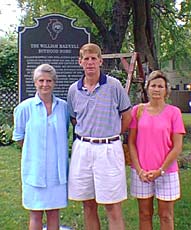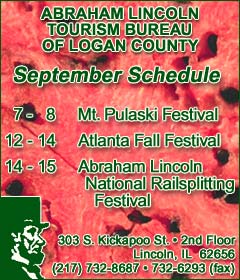|
Although they visited
Lincoln only once as girls, Kate Maxwell and her sister, Brookie,
were well aware of the importance the house at 184 Ninth St. held in
their father’s memories. This was the family home when his mother
died during the Spanish influenza epidemic of 1918. Maxwell was only
10, and for him "The worst that could happen had happened, and the
shine went out of everything" ("So Long, See You Tomorrow").
Blinn Maxwell, the
author’s younger brother, and his wife, Inez, both of Oxnard,
Calif., also attended the dedication. Blinn Maxwell was two days old
when his mother died, and he lived in the house on Ninth Street for
only two weeks. After that he was raised by his aunt and uncle
Maybel and Fred Coffman at 331 N. Union St. Blinn Maxwell spoke of
his brother’s love for Lincoln and for the people here.

[Photos by Lynn Spellman]
[Annette, Bill and Lauri Bates]
Family members
present from Lincoln included Annette Bates, Bill and Lauri Bates,
and Ted and Marlene Perry. Annette Bates is the namesake of her
paternal grandmother, William Maxwell’s aunt.
Emcee for Saturday’s
dedication ceremony was David Welch of Lincoln, who researched and
wrote the wording of the plaque and conducted the fund-raising
drive. Erecting this marker to Maxwell is appropriate, he said,
because the author put Lincoln on the literary map and because of
his lifelong affection for this house. Welch quoted from a letter
Maxwell wrote him in early 2000. At 91 the writer could still say,
"At night in my thoughts I often walk through the house."

[to top of second column in
this article] |

Barbara Burkhardt,
Maxwell scholar on the faculty of University of
Illinois-Springfield, noted that in his works the home often becomes
the outward expression of inner relationships. The house on Ninth
Street was the first of several houses Maxwell endowed with meaning.
The town of Lincoln assumed symbolic significance as well. "He molds
Lincoln into a distinct, beloved place of America’s literary
landscape," Burkhardt said. She recalled the many rapt listeners as
Maxwell read from his works on the day he received the PEN/Malamud
Award at the Folger Shakespeare Library in Washington, D.C.

[Barbara Burkhardt and Barbara Jones]
Rounding out the
speakers was Tom Teague, executive director of the Illinois State
Historical Society, which approved the text and arranged for casting
the marker. Teague noted that his organization is private and that
historical markers in Illinois are privately funded. Welch said
about 40 people contributed.
In 1997 Maxwell
donated his papers to the library of the University of Illinois in
Urbana/Champaign. Barbara Jones, U of I rare-book librarian, and
Gene Rinkel, curator of special collections, attended the ceremony.
Rinkel said boxes of letters and manuscripts continue to arrive as
Kate and Brookie Maxwell, both of New York, sort through their
father’s effects.
Welch presented an advance reader’s copy
of Maxwell’s "All the Days and Nights" to Tim and Tami Kennett,
owners of 184 Ninth St., in appreciation for their cooperation. The
celebration ended with a luncheon at The Restaurant at the Depot.
[Lynn
Shearer Spellman]
|
|
Ameren is seeking regulatory approval
for its agreement to purchase Peoria-based Cilcorp and its
subsidiary, CILCO.
"Now is the time to begin developing a
strong relationship with CILCO customers," said Gary L. Rainwater,
president and CEO of Ameren. "Throughout our 100-year history, we
have prided ourselves on our commitment to our customers and the
communities we serve. Power Player is one example of that
commitment."
For more information or a grant
application, visit http://powerplay.ameren.com
or call Ameren toll-free at (877) 426-3736, Ext. 46441.

[to top of second column in
this article] |

Grants will be awarded on a first-come,
first-served basis. Applications must be postmarked no later
than Oct 31. Grant requirements include the following:
• Players must be 14 years
of age or younger.
• Teams may not be
sponsored by a school.
• Teams must be based
within the CILCO service territory.
• The submitter must be at
least 21 years old.
• An endorsement letter
from an official of each team’s league must accompany each
application.
•
Teams receiving the grants are required
to affix the embroidered Ameren Power Player patch on the players’
uniforms.
[Dayle Eldredge] |